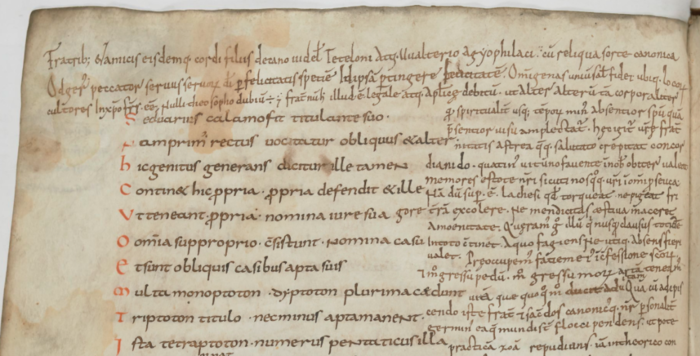Tidligere arrangementer - Side 45
Department seminar. Sandeep Baliga is the John L. and Helen Kellogg Professor of Managerial Economics and Decision Sciences in the MEDS Department at the Kellogg School of Management, Northwestern University. He will present the paper: "Long Wars" (written with Tomas Sj?str?m).
QOMBINE seminar by Satvik Singh (University of Cambridge): The PPT2 conjecture for diagonal unitary covariant map
Department seminar. Karine Nyborg is a Professor at the Department of Economics, University of Oslo. She will present the paper: "Moral responsibility as a driver of polarization" (written with Kjell Arne Brekke).
Self-assembly is the spontaneous generation of order in systems driven by thermal agitation and interactions. At the molecular level, self-assembly plays an important role in the formation of giant com- plex macromolecules, being quite relevant for living systems. At the mesoscopic level, capillary driven self-assembly has been proposed for building structures in the gap between classical bottom-up and top-down fabrication methods, i.e. at the scales in between 10 micrometers and 1 millimeter. Although the method was proposed 20 years ago, only regular or simple structures were achieved so far. Using both experimental and statistical physics ideas, we demonstrate how to exploit subtle capillary interactions to create elaborate complex structures, as well as functional micromachines. On top of that, we show how such mescoscopic systems can be the analogues of many different physical systems such as folding molecules, molecular locks and keys, and crystal formation.
Welcome to an afternoon of Neuroscience Seminar with coffee, tea & buns. With Professor Emre Yaksi and Professor Tommaso Pizzorusso.
Department seminar. Marta Prato is an Assistant Professor of Economics, Bocconi University. She will present the paper: "Career Choice of Entrepreneurs and the Rise of "Smart" Firms" (written with Ufuk Akcigit, Harun Alp, and Jeremy Pearce).
C*-algebra seminar talk by Suvrajit Bhattacharjee (University of Oslo)
Department seminar. Pamela Giustinelli is an Assistant Professor at the Department of Economics, Bocconi University. She will present the paper: "The Coherence Side of Rationality: Rules of thumb, narrow bracketing, and managerial incoherence in corporate forecasts" (written with Stefano Rossi).
Fornyelse av offentlig sektor vil kreve utvikling og 澳门葡京手机版app下载 p? tvers, men dette krever finansierings- og styringsmekanismer som underst?tter behovet for 澳门葡京手机版app下载.
Atlantique is a 2019 internationally co-produced supernatural romantic drama film directed by Mati Diop, in her feature directorial debut. The film is centered around a young woman, Ada, and her partner, Souleiman, struggling in the face of employment, class, migration, crime, family struggles, and ghosts.
Bernhard Hollick (IAKH, UiO)
Assistant Professor of Musicology, Michiel Kamp, from Utrecht University, will speak at RITMO's Seminar Series
Once a month, NCMM invites international guest speakers to present on topics within molecular life science and medicine.
Seminar with Marta Hanson.
Active solids consume energy to allow for actuation and shape change not possible in equilibrium. In this talk, I will focus on the elasticity of systems as wide-ranging as far-from-equilibrium hydrogels, nanoparticles, and mechanical structures composed of active robotic components. First, I will introduce our recent work on hydrogel spheres being lowered onto a hot plate. As the bottom vaporises, the resulting flow couples tightly to elastic deformations within the sphere, giving either spontaneous bouncing or steady-state floating as manifestations of the so-called elastic Leidenfrost effect. I will present theory and simulations of the floating case, which demonstrate a remarkable phenomenon: the heavier the solid, the higher it floats. I will then discuss the general competition between active boundary stresses and an elastic bulk, giving rise to so-called active elastocapillarity. Finally, I will discuss our current work on using non-reciprocal interactions in active elastic media to program robust mechanical actuation and locomotion. In each case, our results provide theoretical underpinning for recent experimental advances, and point to the design of novel soft machines.
Mingle meeting at ITA with updates and cake.
I will discuss the “geometric method” for syzygies and discuss applications to the study of tautological bundles of linear spaces. From this, I will explain how to pass from realizable matroids to all matroids via initial degenerations. This is joint work in progress with Alex Fink and Chris Eur.
Department seminar. Kathrin Schlafmann is an Assistant Professor at the Copenhagen Business School. She will present the paper: "Expectations and Wealth Heterogeneity in the Macroeconomy" (written with Tobias Broer, Alexandre Kohlhas, and Kurt Mitman).
A finite graph determines a Kirchhoff polynomial, which is a squarefree, homogeneous polynomial in a set of variables indexed by the edges. The Kirchhoff polynomial appears in an integrand in the study of particle interactions in high-energy physics, and this provides some incentive to study the motives and periods arising from the projective hypersurface cut out by such a polynomial.
From the geometric perspective, work of Bloch, Esnault and Kreimer (2006) suggested that the most natural object of study is a polynomial determined by a linear matroid realization, for which the Kirchhoff polynomial is a special case.
I will describe some ongoing joint work with Delphine Pol, Mathias Schulze, and Uli Walther on the interplay between geometry and matroid combinatorics for this family of objects.
QOMBINE seminar by Roy Araiza (University of Illinois Urbana-Champaign)
Legend has it that the capoeira player Besouro Mangangá summoned Bahia’s full magical power to seal his body from harm. Neither bullet nor knife could pierce his skin anymore.
By Franck L. P. Lejzerowicz, Postdoc at AQUA, IBV
Innovations in fluid mechanics are leading to better food since ancient history, while creativity in cooking inspires applied and fundamental science. In this talk, I will discuss how recent advances in hydrodynamics are changing food science, and how the surprising phenomena that arise in the kitchen lead to discoveries and technologies across the disciplines, including rheology and soft matter. Central topics include cocktails and champagne (multiphase flows), whipped cream (complex fluids) and pancake making (viscous flows). For every topic, I will present the state-of-the-art knowledge, the open problems, and likely directions for future research.
Publications:
Mathijssen, A. J., Lisicki, M., Prakash, V. N., & Mossige, E. J. (2023). Culinary fluid mechanics and other currents in food science. Reviews of Modern Physics, 95(2), 025004.
Fuller, G. G., Lisicki, M., Mathijssen, A. J., Mossige, E. J., Pasquino, R., Prakash, V. N., & Ramos, L. (2022). Kitchen flows: Making science more accessible, affordable, and curiosity driven. Physics of Fluids, 34(11).


/animerdesmicromachines2.jpg?alt=listing)







.jpg?alt=listing)

/2023/jackbinyish.webp?alt=listing)




/2023/joachimmossige.jpg?alt=listing)